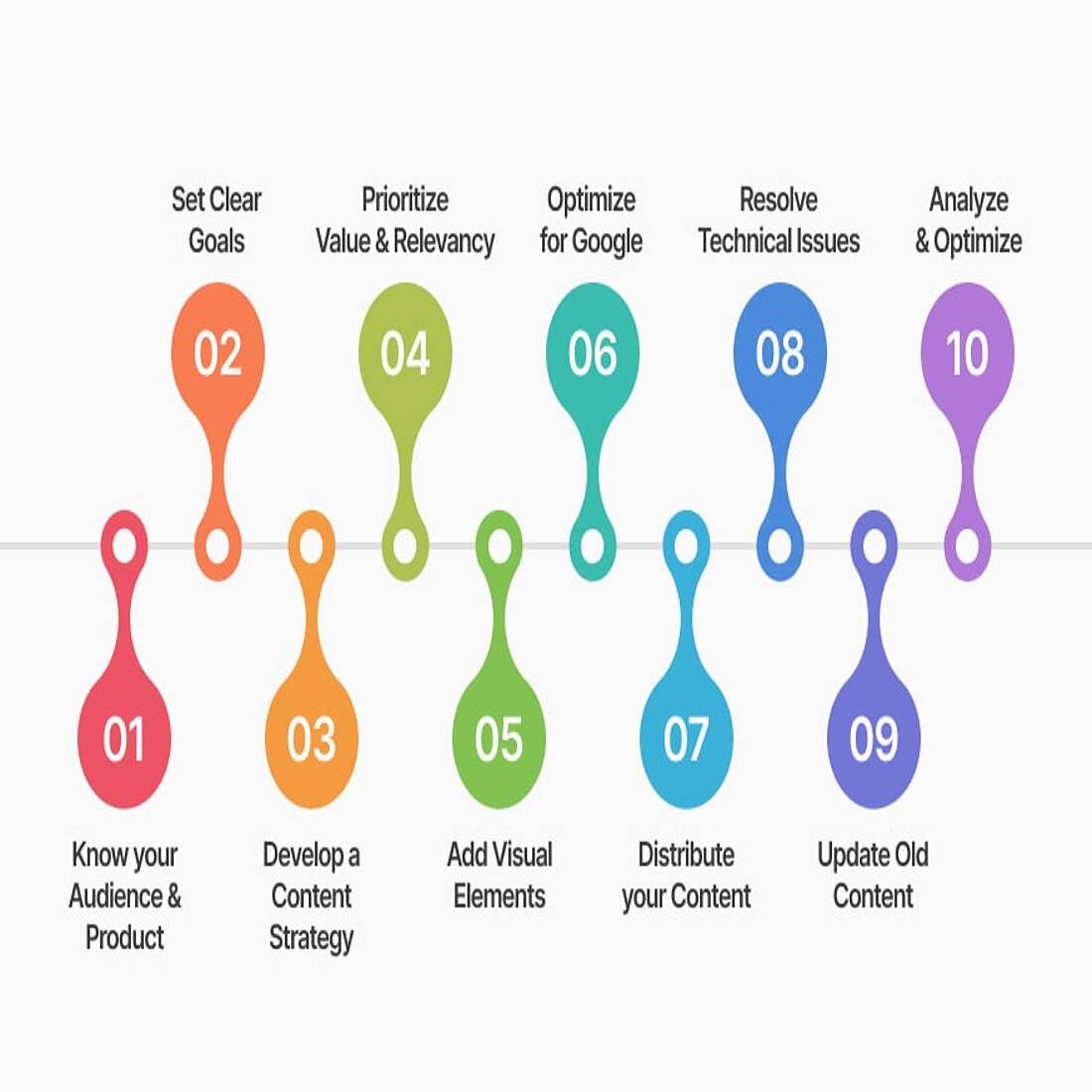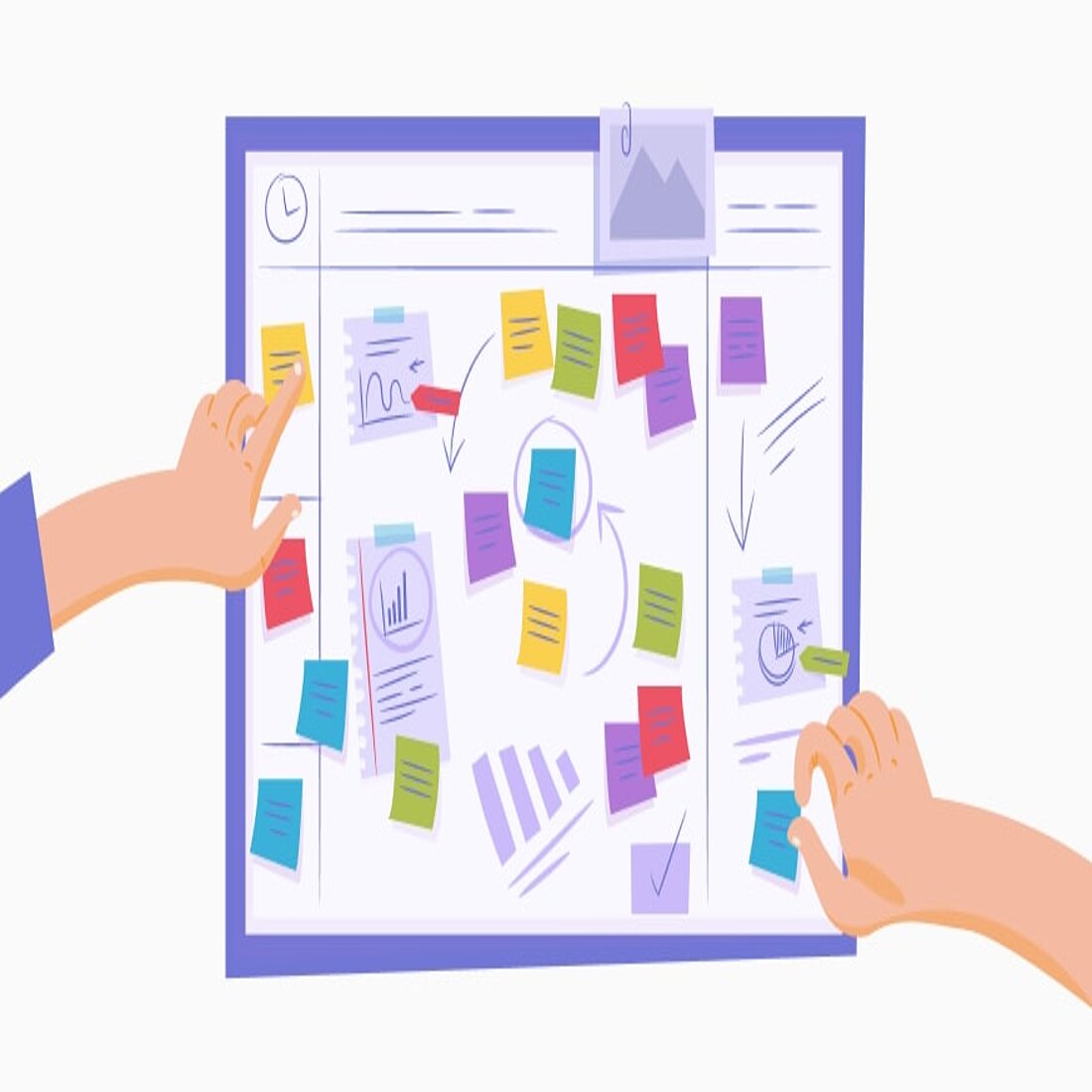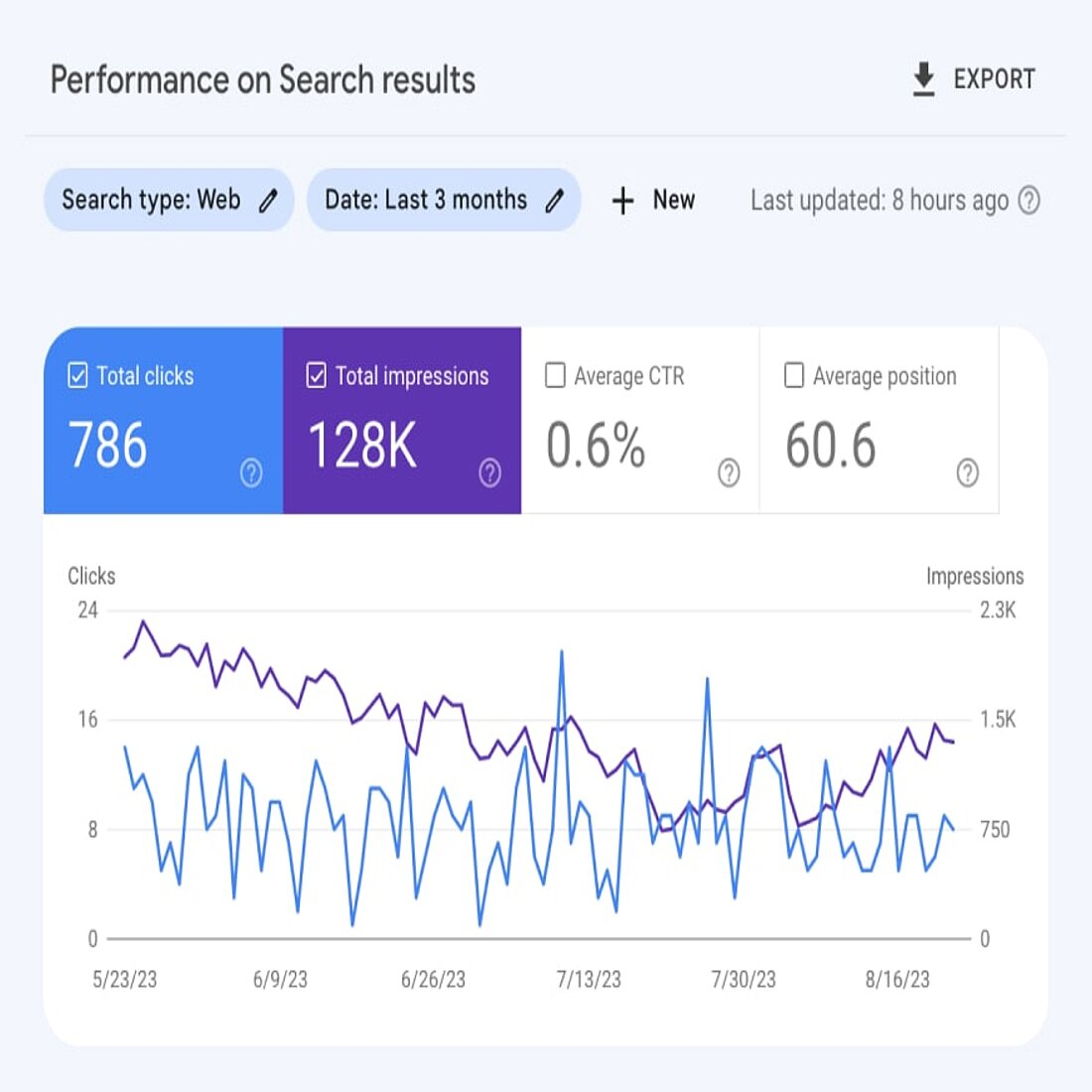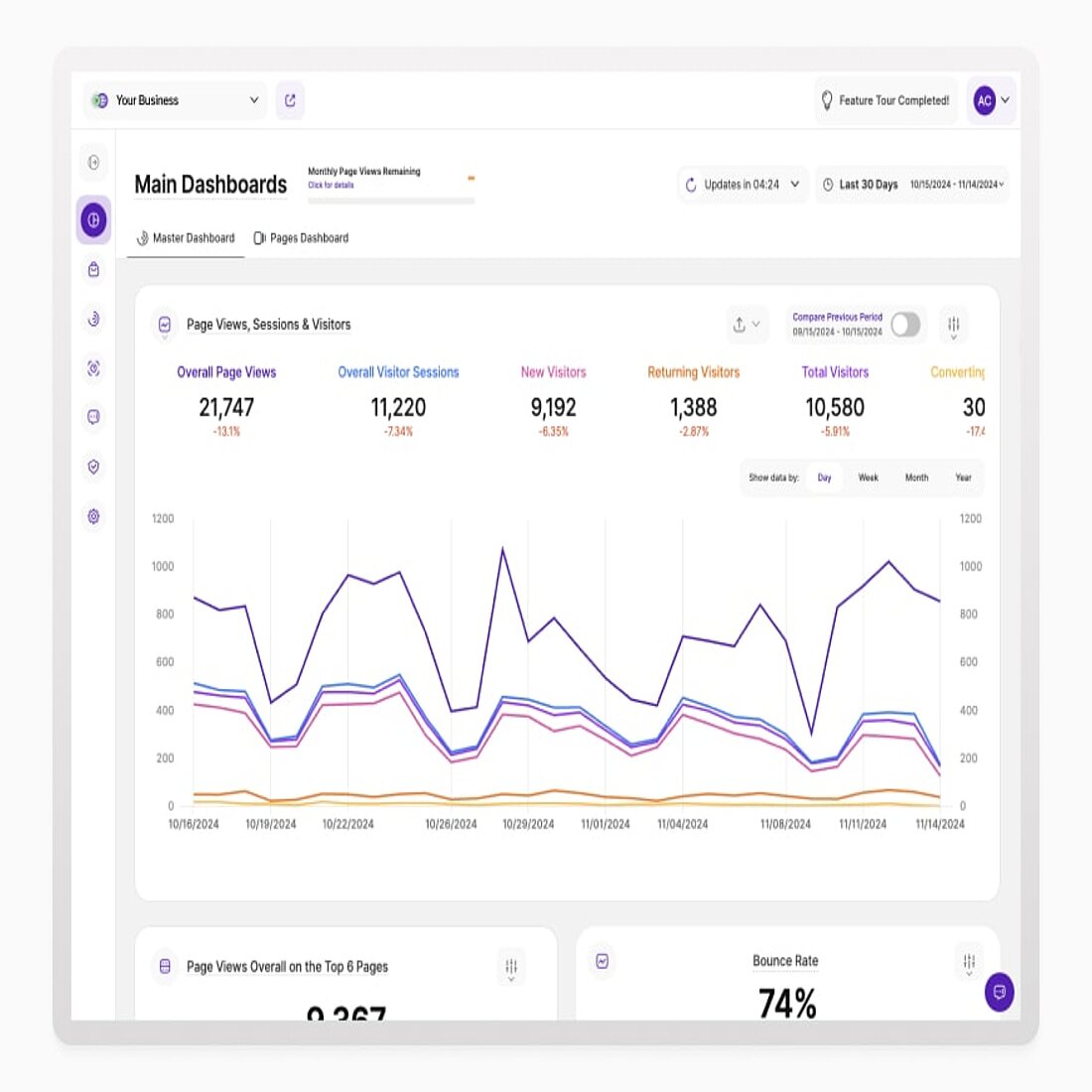- Why Us?
- Features
White Label
For SaaS Platforms & Agencies
Provide our complete analytics suite to your clients, directly within your own interface and with your/their own branding. Discover Analytics-as-a-Service and White Label Analytics. Great benefit, minimal effort.
- Pricing
- White Label
- Success Stories
- Partner
- ResourcesExpand Your Knowledge
CONTENTS
- Core Content Principles
- 1. Know your Audience and Product
- Know Your Audience
- Know Your Product
- 2. Set Clear Goals
- 3. Develop a Strategy
- 4. Prioritize Value and Relevance
- 5. Valuable Content Is More than Just Words
- 6. Optimize How Your Content Appears on Google
- 7. Distribute Your Content
- 8. Resolve Any Issues on Your Pages
- 9. Analyze Data on Content Performance
- 10. Update your Content Periodically
- Content Marketing Tips for Startups
- 11. Use Insights from Early Customers
- 12. Analyze Your Competitors
- 13. Stay Flexible and Adjust Your Strategy
- Content Marketing Tips for Small Businesses
- 14. Think Local
- 15. Create Localized Content
- 16. Optimize Your Google My Business Profile
16 Actionable Content Marketing Tips for Guaranteed Results

Brilliance in content marketing doesn’t happen by accident.
Instead it’s the outcome of thoughtful planning, careful strategizing, performance analysis, and ongoing optimization.
In this blog, you’ll find some effective content marketing tips and tricks that will help you become better at what you do.
By gradually implementing these ideas into your processes, you’ll soon start seeing your numbers improve.
Core Content Principles
These 16 easy tips for effective content marketing still give you a lot to consider, and it’s understandable to feel a bit overwhelmed.
But by sticking to a few core principles, you can keep your team focused on what truly matters:
- Quality over quantity: Create valuable, relevant, and impactful content that positions your business as a trusted authority.
- Understand your audience: Identify who your audience is, the channels they prefer, and how your products or services can solve their unique challenges.
- Consistency is key: Set realistic content goals that align with your team’s size and capabilities to ensure reliable delivery over time.
- Focus on connection: Engage, educate, and build trust with your audience rather than simply promoting your business.
- Stay adaptable: Adopt an agile marketing mindset by regularly refining your strategy to stay relevant and aligned with your audience.
With these guiding principles, the following content marketing tips will help take your work to the next level.
1. Know your Audience and Product
One of the best tips for content marketing is to focus on effectively communicating your unique selling propositions (USPs) to the people who will benefit most.
At TWIPLA, for instance, it's the privacy-first features of our comprehensive website intelligence solution that help make digital business goals more achievable - and without a cookie banner.
However, not everyone on our marketing team came in with a background in website analytics or data protection laws, so ongoing education and testing have become essential drivers in our content process.
We've also invested heavily in researching why clients choose our platform over competitors, identifying the types of businesses most likely to benefit from TWIPLA, and pinpointing the key decision-makers.
Know Your Audience
"Content marketing is more than a buzzword. It is the hottest trend in marketing because it is the biggest gap between what buyers want and brands produce.”
– Michael Brenner, VP of Content @ Workday
Knowing your audience is essential for creating content that meets their needs and addresses their concerns.
If this is done well, your content will resonate more with prospects and drive business success.
To achieve this, consider these approaches:
- Review current data and analytics: Analyze existing data to uncover insights about your audience’s behavior, preferences, and pain points.
- Learn from previous successes: Examine past content or campaigns that resonated with your audience to identify what made them effective.
- Create buyer personas: Develop detailed profiles - user personas - of your ideal customers, including job roles, preferred publications, and key challenges to guide your messaging and tone.
- Conduct surveys: Gather direct feedback to better understand your audience’s needs, preferences, and expectations.
- Use industry reports and third-party studies: Market research gives businesses well-researched data on consumer trends, competitors, and market gaps without needing to gather it all first-hand.
- Monitor competitors: Observe how competitors engage their audiences and the strategies they employ.
- Engage with feedback: Pay attention to audience comments and interactions on your content to refine your approach.
- Experiment with content: Regularly test new content formats and updates to see what resonates best with your audience.
Companies that meet or exceed revenue targets are 2.4 times more likely to be building their marketing around buyer personas - Marketing Interactions
Know Your Product
"Content marketing is really like a first date. If all you do is talk about yourself, there won't be a second date"
- David Beebe, Founder @ Marriott Content Studio
Understanding your product is the cornerstone of an effective marketing strategy.
It’s not just about what you offer; it’s about how your product fits into your customers’ lives and the unique value it brings.
However, it’s crucial not to oversell your business.
Instead, adopt a softer approach:
→ let your voice build trust,
→ weave in information about your product's capabilities,
→ and position yourself as an authority.
While this may seem obvious, integrating this understanding into your content strategy can be challenging.
Here are key areas to focus on:
- Core features and benefits: Clearly identify what your product does and how it solves specific problems for your target audience. Highlight the unique benefits that set it apart from competitors.
- Unique selling proposition (USP): Determine what makes your product stand out. Whether it’s superior quality, innovative features, or exceptional customer service, your USP should guide your messaging and resonate with your audience's needs.
- User experience: Consider how customers interact with your product. Understanding their journey - from discovery to usage - provides valuable insights for creating content that enhances customer experience (CX) and satisfaction.
- Customer feedback: Regularly gather and analyze user feedback. This not only identifies areas for improvement but also reveals opportunities to create content that addresses your audience’s pain points.
- Market trends: Stay informed about industry trends that could impact your product’s relevance. Adapting your messaging to align with these trends keeps your content fresh and engaging.
Businesses that prioritize product knowledge training have a 32% higher customer retention rate - Brandon Hall Group/LinkedIn
2. Set Clear Goals
“There is no content strategy without measurement strategy. Before embarking on a content initiative, irrespective of medium or platform, it’s important to know what you want to achieve.”
– Rebecca Lieb, Chief Marketing Officer @ Coney Island USA
The next of our effective content marketing tips focuses on what you're creating output for, and it's something that any CMO should consider when creating their marketing strategy.
It’s not just about covering interesting topics; every piece you publish should align with specific, measurable business goals.
Simply aiming for page views isn’t enough if it doesn’t serve a larger purpose.
Instead, think of each new page as a building block in your overall marketing strategy.
Imagine a scenario where your team is focused on producing blogs to boost organic traffic. For this effort to be effective, you’ll need to:
→ Know the audience you’re writing for
→ Understand what type of content genuinely serves their needs
→ Connect each topic back to your business goals.
And above all, make sure these goals are realistic:
How many people are in your content team?
Creating quality content requires the time and focus of skilled writers, but it’s also a team effort. A talented SEO specialist needs to ensure visibility, a designer must make the content visually engaging, and a marketing manager provides the oversight to catch potential issues others might overlook. For international audiences, translation may also be necessary - especially as Google values consistency in translation across your site.
It’s a collective effort that goes beyond writing alone.
What budget and resources does your team have?
Content creation is often a balancing act with limited resources. Designers are frequently stretched thin with competing priorities, from social media graphics to product visuals. Meanwhile, SEO specialists juggle ongoing optimizations, and marketing managers oversee multiple campaigns at once.
All this can make it tough to give each piece of content the attention it deserves, especially when budgets don’t match the ambition.
What volume of quality output can your team reliably produce?
Consistency is crucial.
Google values regular webpage updates, and at TWIPLA, we publish a new blog every Tuesday without fail.
A sporadic posting schedule - like publishing three times in one week and then going silent for a month - can disrupt engagement and weaken your efforts.
Instead, set a manageable pace that you can sustain. Whether that means one piece a week or two a month, maintaining a steady flow keeps your audience engaged and signals reliability, ultimately strengthening your content’s impact.
86% of marketers fail to align their output with business goals - Digital Resource
3. Develop a Strategy
"When taking a content-first approach, our job as marketers is not to create more content … it’s to create the minimum amount of content with the maximum amount of results.”
– Robert Rose, Chief Strategy Officer @ The Content Advisory
Once you’ve established realistic goals based on your business’s unique circumstances, the next tip is to develop a comprehensive content strategy that will support your content marketing efforts.
A well-structured strategy helps ensure your content aligns with your goals and effectively engages your audience.
Here are key components to consider:
- Primary Keyword List: Identify a selection of strategic SEO keywords that balance a search volume and competitiveness appropriate for your business, guiding your content creation efforts to enhance visibility in search engines.
- Editorial Calendar: Develop a clear timeline for content publication that outlines key milestones, ensuring a consistent flow of content while helping you stay organized.
- Target Audience Personas: Create detailed profiles of your ideal readers, capturing their preferences, challenges, and behaviors to effectively tailor your messaging.
- Content Formats: Decide on the types of content - such as blogs, videos, and infographics - that will best engage your audience and align with your marketing objectives.
- Distribution Channels: Choose the platforms like email, Facebook, and YouTube that will maximize your content's reach - and engagement - with the right audience.
- Measurement and Evaluation Metrics: Establish key performance indicators (KPIs) to assess the effectiveness of your content strategy, including engagement rates, conversion rates, and organic traffic growth.
70% of content marketers reported having a strong strategy in place - Content Marketing Institute
4. Prioritize Value and Relevance
“Actually talk to your customers. Use the language that they use. Talk about the things they talk about. Never feed salad to a lion.”
– Jay Acunzo, Marketing Expert @ Unthinkable Media
One of the best content marketing tips and tricks we can give is to strive for quality in everything you produce.
You can improve the content creation process by delivering content that meets your audience where they are and gives them what they need, when they need it.
Rather than focusing on sheer volume, address real concerns, answer questions, and solve the problems your audience faces.
Every piece of content should serve a purpose - whether it’s to educate, inspire, or guide your readers through a specific challenge.
- Connect relevance with timing: Consider not only what your audience cares about but also when it’s most relevant to them. Content that speaks to current trends or seasonal needs is more likely to resonate, making your brand a go-to source for timely information.
- Demonstrate practical value: Content that offers actionable insights or easy-to-apply tips positions your brand as genuinely helpful. Use examples, step-by-step guides, and marketing case studies to show practical applications and value beyond the abstract.
- Keep It audience-focused: Regularly update your understanding of your audience’s interests, preferences, and pain points to ensure your content stays aligned with their evolving needs. By consistently delivering value, you build trust, increase engagement, and create a stronger connection with your audience over time.
83% of marketers say it’s better to focus on quality rather than quantity of content, even if it means posting less often - HubSpot
61% of marketers say improving the quality of their content increases organic search ranking - Semrush
5. Valuable Content Is More than Just Words

Another of the best tips for content marketing is to remember that value isn’t limited to words on a page; it’s a dynamic mix of elements that keeps audiences engaged and amplifies your message.
Incorporating visuals such as images, infographics, and videos doesn’t just break up text; it also helps communicate complex ideas quickly and creates a richer experience for your audience.
Enhance understanding with visuals: Infographics and illustrations make information more accessible, and easier to grasp at a glance.
This is particularly beneficial for data-heavy content, where images and charts facilitate comprehension.
Engage with video content: Video marketing is a way to elevate your content by showing rather than telling.
Whether through tutorials, product demos, or customer testimonials, video connects with audiences on a personal level, fostering trust and extending engagement.
Design for Readability and flow: A well-structured layout, featuring clean design and appropriate spacing, makes your content inviting and easier to navigate.
Utilize headers, bullet points, and embedded media to guide readers through your content seamlessly.
Of course, this also requires that you get the fundamentals of your website right in the first place.
But by offering valuable content that transcends words, you cater to diverse preferences and create a more immersive, memorable experience for your audience.
Engaging multiple senses through various formats not only enhances retention but also strengthens your brand's connection with its audience.
Over 50% of marketers agree that visual content is essential to their marketing strategy - Venngage
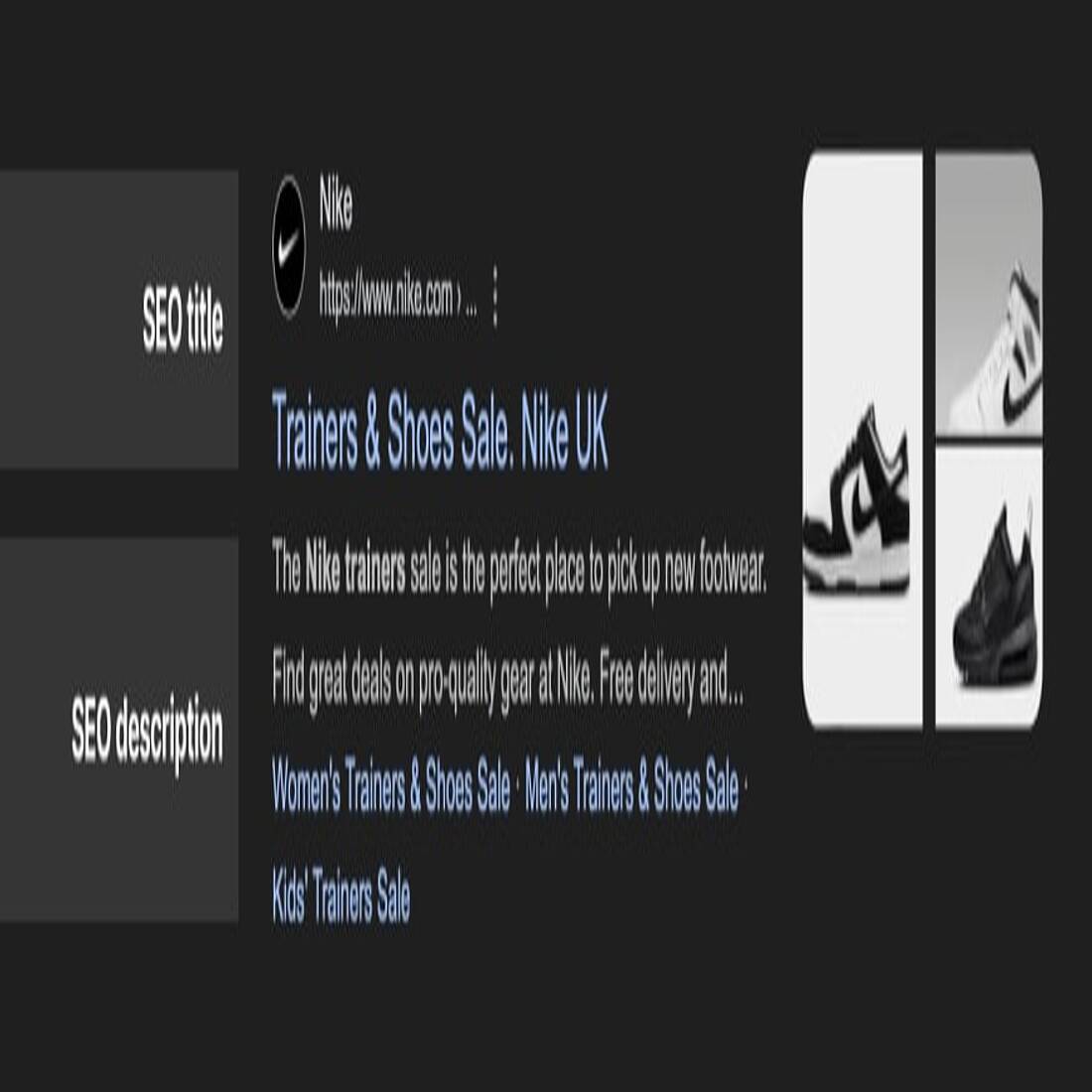
6. Optimize How Your Content Appears on Google
“People don’t find content by mistake, or by accident. Every content plan needs a complementary promotion plan that combines paid, owned, and earned media.”
– Matthew Gratt, Growth Marketing & Lead Generation Consultant
Read the TWIPLA Interview: Yoast Head of SEO Carolyn Shelby on Evolving SEO Trends
This list of effective content marketing tips wouldn’t be complete without addressing organic traffic.
When it comes to search, the appearance of your content in search engines is what gets people to click in:
Craft attention-grabbing titles: Your SEO title is the first thing a searcher sees, and often the first contact they have with your company - so make it count.
Use clear language, keep it below Google's 60-character limit, and consider adding an element of curiosity to make people want to know more. Questions, numbers, or an unexpected angle can be effective for pulling readers in.
Write meta descriptions that drive clicks: A well-crafted meta description gives a glimpse of what’s in store and can be the difference between a searcher passing by or clicking through.
Aim for enticing summaries shorter than 158 characters that incorporate relevant keywords, without sounding forced or robotic.
Optimize URLs for clarity and keywords: Clean URLs that include relevant keywords signal both to users and search engines what the page is about.
Avoid clutter in the URL, as simpler, keyword-focused URLs tend to rank and resonate better. If you want to see a good example of this, check out this page's URL - which is just the primary keyword phrase we've chosen for the blog.
Use structured data to stand out: By using schema markup or structured data, you can make elements like reviews, product information, or FAQs appear directly in search results.
These extras give users helpful info right on the search page, often improving click-through rates by standing out visually.
But ultimately, focusing on how your content looks in search results isn’t just about attracting clicks - it’s about ensuring that the right people find and engage with your content, boosting relevance and success over time.
High-quality content is the most effective SEO strategy according to 59% of B2C marketers - Forbes Advisor
7. Distribute Your Content
“It’s not the best content that wins. It’s the best-promoted content that wins.”
– Andy Crestodina, CEO @ Orbit Media Studios
Read the TWIPLA Interview: Andy Crestodia on Effective Content SEO
Effective content distribution is crucial for maximizing reach and authority.
To ensure your content gets the attention it deserves, focus on these key strategies:
Collaborate with reputable websites: Partner with established sites in your niche to enhance visibility.
Guest posting, co-creating content, or engaging in link exchanges with high-quality domains can significantly boost your content’s credibility and search rankings.
These relationships create valuable backlinks, signaling to Google that your content is trustworthy.
Leverage social media: Social media has many benefits for businesses so remember to actively promote your content across the relevant channels.
Use engaging visuals and compelling snippets to capture attention and encourage shares.
Social media is a powerful tool to reach a wider audience and create buzz around your content, making it more likely to attract backlinks and additional traffic.
Create shareable content: Focus on producing high-quality articles, guides, or infographics that provide real value.
Content that addresses specific problems or insights in your industry is more likely to be shared and linked to by others, amplifying your reach.
Utilize newsletters: Don’t overlook the impact of email marketing (and email automation).
Share your content through newsletters to engage your existing audience.
Highlight valuable insights or offer exclusive content to drive clicks and foster engagement.
By effectively distributing your content through collaborations, social media, and newsletters, you can significantly enhance visibility and authority, ensuring that your content stands out in a crowded digital landscape.
8. Resolve Any Issues on Your Pages
“Technical SEO is like the foundation of a house. If it’s not solid, the whole thing could collapse.”
– Unknown
Ensuring a seamless experience on your pages is vital for keeping visitors engaged and satisfied.
Technical issues - whether it's broken images, slow-loading pages, faulty links, or a poor mobile layout - can quickly turn away users and erode trust in your brand, and erode website credibility.
Check for broken elements: Regularly scan your pages for broken images, links, client error pages (4XX), or missing elements.
These issues can frustrate users and make your content look neglected, so a quick fix here goes a long way in maintaining a professional look.
Optimize for speed: Slow pages drive visitors away.
Use tools like Google PageSpeed Insights to see where load times can be improved, whether through compressing images, reducing code bloat, or implementing caching strategies.
The faster your page load speed, the more likely visitors are to stick around.
Prioritize mobile experience: With more users on mobile than ever, mobile marketing strategies are essential.
Ultimately, content must look and function perfectly on any screen size so test your pages on different devices to ensure the layout, images, and text are easy to view and navigate on mobile.
Put yourself in the user’s shoes: Approach each page as if you were a visitor.
Is it easy to find what you're looking for?
Does the layout feel welcoming and intuitive?
By viewing the experience from your audience’s perspective, you can better identify issues that might otherwise go unnoticed.
Addressing these technical and user experience details will help ensure visitors enjoy a smooth, frustration-free experience on your site, making them more likely to return and engage with your content.
Only 33% of websites pass the Core Web Vitals threshold that Google considers important for a healthy user experience on the web - Ahrefs
9. Analyze Data on Content Performance
“More content is not better. What’s the worst case scenario if we slow ourselves down and do some analysis?”
– Kristina Halvorson, CEO @ Brain Traffic
Analyzing visitor behavior is key to understanding how satisfied people are with your content.
With TWIPLA's analytics tools, you can dive into metrics that reveal how your audience is engaging - do they leave quickly, or are they exploring further? This data highlights how well your content connects and whether it’s meeting visitor expectations.
For instance, look at bounce rates and session duration to see how long people are staying and which content holds their interest.
High bounce rates or short visits may indicate that the content isn’t engaging enough, while longer session times and multi-page visits suggest that visitors find real value and are willing to explore more.
By identifying these patterns, you can optimize your content to boost satisfaction, making adjustments to enhance visitor engagement and ensure they’re connecting with the messages you’re delivering.
Consider implementing actionable insights from your data analysis; for example, revise underperforming content, improve visuals, or adjust your call-to-actions to better resonate with your audience.
A/B testing can also be an effective method for comparing different content variations to see which performs better, allowing you to refine your approach continually.
Finally, make it a habit to conduct regular reviews of your analytics.
Staying responsive to changing audience preferences and behaviors ensures that your content remains relevant and engaging over time.
10. Update your Content Periodically
“Don’t be distracted by those people who are always demanding something new. The strategy of making most of your content evergreen is powerful. It allows you to build an asset bank of content that can be constantly shared.”
– Jeff Bullas, Digital entrepreneur, AI thought leader, and marketing blogger
As your website grows, you’ll soon have plenty of leaves on your content tree if you haven’t already.
Evergreen content is particularly advantageous for smaller teams.
This type of material remains relevant and valuable to readers long into the future, regardless of current trends or events.
However, the digital landscape moves quickly - Google’s algorithm evolves, and content that once delivered results can lose its effectiveness over time.
Therefore, it’s crucial to revisit all existing content and identify opportunities for improvement.
Consider these strategies:
- Update content to keep it feeling fresh for potential visitors.
- Merge related articles into a comprehensive guide that adds value.
- Add new visuals to enhance attractiveness and engagement.
- Include more inlinks to newer pages to reduce bounce rates.
- Restructure content to improve flow and increase time on page.
- Break up longer paragraphs and sentences for easier reading on mobile devices.
None of these changes take much time to implement, but they can significantly enhance your content's performance and relevance, ensuring it continues to attract and engage your audience.
Content Marketing Tips for Startups
11. Use Insights from Early Customers
Engaging with your initial customers to uncover their specific needs, feedback, and product use cases is one of our top tips for growing your online business quickly.
Conduct surveys or interviews to gain insights into their pain points and how they perceive your product.
These insights help shape content that addresses real concerns and showcases the value of your offerings.
Additionally, consider creating case studies or testimonials from early adopters to build credibility and demonstrate how your product solves their problems.
12. Analyze Your Competitors
The next in our content marketing tips for startups is to study competitors’ content to understand what resonates in your market.
Look for trends in their blog posts, social media strategies, and customer engagement tactics.
Identify gaps or unique angles they haven’t covered - this could be addressing niche topics, specific customer pain points, or innovative solutions.
By filling these gaps with high-quality, relevant content, you can position your brand as a thought leader in your industry.
13. Stay Flexible and Adjust Your Strategy
Content strategies evolve as market dynamics shift.
Regularly review your performance data, learn from what works, and adapt your content to stay relevant and effective.
This could involve A/B testing different content formats or topics to see what resonates best with your audience.
Additionally, remain open to feedback from your audience and industry trends, ensuring that your content strategy aligns with their changing preferences and needs.
Content Marketing Tips for Small Businesses
14. Think Local
While B2B content marketing tips will be slightly different from B2C, most advice is general enough to apply to all business types.
Focus on building connections with your local audience.
Highlight your roots in the community and show how your offerings meet local needs.
Share stories about your business's journey and your commitment to the local area, which helps foster a sense of loyalty.
Consider collaborating with local influencers or businesses to expand your reach and strengthen community ties.
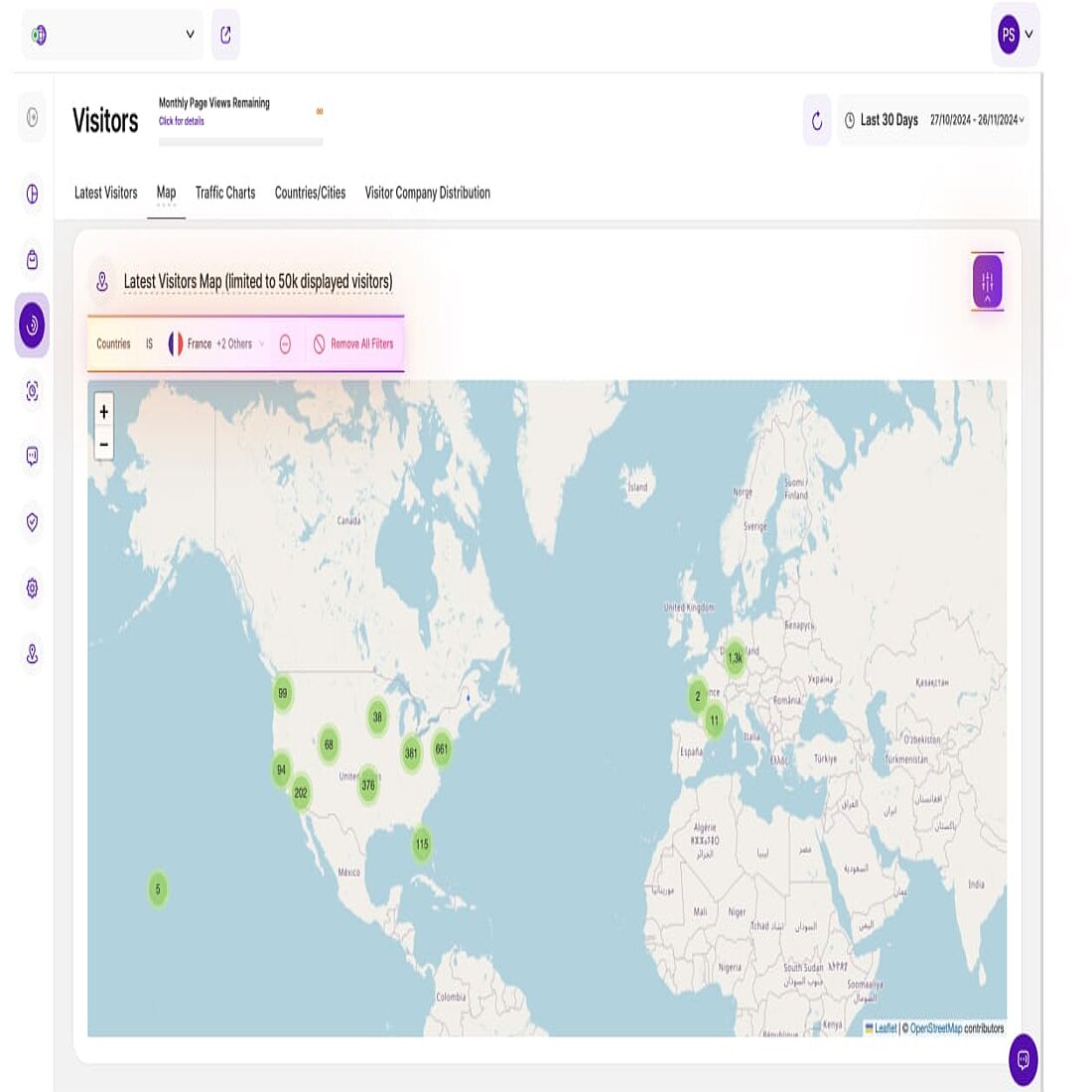
15. Create Localized Content
The next in our content marketing tips for small businesses is to produce content that speaks directly to local interests, events, and cultural touchpoints.
This could include blog posts about community events, interviews with local figures, or guides that highlight the best local spots related to your industry.
By creating relatable content, you make your brand part of the community, fostering engagement and building lasting relationships with local customers.
16. Optimize Your Google My Business Profile
Update your Google My Business profile to improve local search visibility.
Include accurate contact info, hours, and engaging photos to attract nearby customers.
Encourage satisfied customers to leave reviews, as positive feedback can significantly influence potential customers.
Additionally, regularly post updates, promotions, and events on your profile to keep your audience informed and engaged, enhancing your overall local SEO strategy.
Share article
Get Started for Free
Gain World-Class Insights & Offer Innovative Privacy & Security

You might also like
Apps from Design to Success: 13 Wix Apps to Use in 2025 23 May 2023 - by Simon Coulthard
23 May 2023 - by Simon Coulthard
Market Research: The All-in-One Guide to Conducting Market Research 12 September 2022 - by Simon Coulthard
12 September 2022 - by Simon Coulthard





